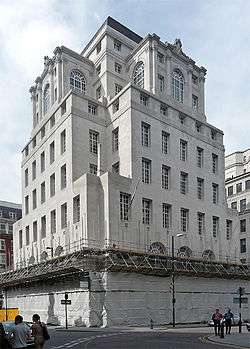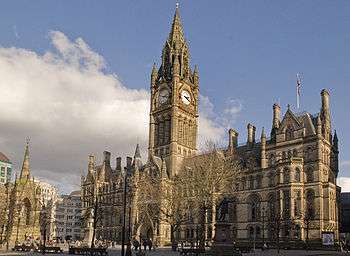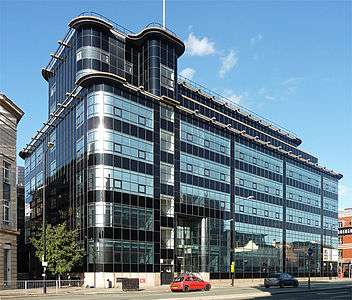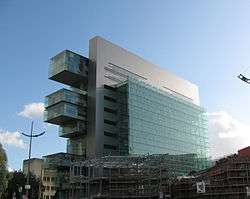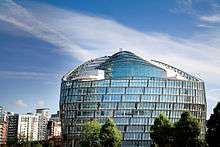100 King Street
| 100 King Street | |
|---|---|
|
The King Street and Brown Street sides of the Midland Bank building | |
| Former names | HSBC Bank building, Midland Bank Building |
| General information | |
| Architectural style | Modernist Classical |
| Address | 56 Spring Gardens |
| Town or city | Manchester |
| Country | United Kingdom |
| Coordinates | 53°28′50″N 2°14′32″W / 53.4806°N 2.2422°W |
| Construction started | 1933 |
| Completed | 1935 |
| Height | 46 metres |
| Technical details | |
| Floor count | 10 |
| Design and construction | |
| Architect | Sir Edwin Lutyens |
| References | |
| [1] | |
100 King Street, formerly the Midland Bank, is a former bank premises on King Street, Manchester, England. It was designed by Edwin Lutyens in 1928 and constructed in 1933–35. It is Lutyens' major work in Manchester and was designated a Grade II* listed building in 1974.[2]
Architecture
A castle-like Art Deco building, surrounded by roads on all four sides,[3] the former bank was built by the engineers Whinney, Son & Austen Hall between 1933 and 1935 and features carvings by the local sculptor John Ashton Floyd.[4] It is constructed of Portland stone around a steel frame.[5] Its neoclassical design is unusual for Manchester, the style perhaps more suited to the architecture of Liverpool, as most of Manchester's buildings were Neogothic.[6]
"The proportions are ingeniously calculated, as Lutyens ... adored to do. The top stage is two-thirds of the stage from the obelisks to the next set-back, and that middle stage is two-thirds of the bottom stage."[7] It is sometimes known as The King of King Street because of its distinct structure and height.[7][8]
From 1912, Lutyens laid out New Delhi as the new capital of India.[9] He devised his own Delhi Order of classical architecture there, with small bells hanging from the capitals of the columns,[10] and subsequently made use of this order in his design for the bank.[4]
History
The bank was renamed HSBC Bank after HSBC acquired the Midland Bank in the 1990s. It closed on 6 June 2008 when HSBC relocated to St Ann's Square. The building was subsequently refurbished to provide office space and was placed on the office rental market in March 2010. Jamie Oliver opened a restaurant in the former banking hall in 2011.[11] A plan to convert the upper floors of the building into a boutique hotel was announced in 2013.[12]
References
- Citations
- ↑ "HSBC Building". skyscrapernews.com. 19 January 2008. Retrieved 18 February 2012.
- ↑ "Midland Bank". English Heritage. Retrieved 19 October 2012.
- ↑ King Street, Spring Gardens, Chancery Lane and Brown Street
- 1 2 Hartwell, Clare (2001), Manchester, Pevsner Architectural Guides, Penguin Books, pp. 165–167, ISBN 978-0-14-071131-8
- ↑ Parkinson-Bailey, John (2000), Manchester: an architectural history, Manchester University Press, p. 144, ISBN 978-0-7190-5606-2
- ↑ "Great White Beauty Comes Clean". Manchester Confidential. 8 August 2011. Retrieved 18 February 2012.
- 1 2 Hartwell Lancashire; Manchester and the South-East; p. 317
- ↑ McQueeney, Kerry (14 February 2012). "How £1m stash of jewellery, Joy Division master tapes and even a GUN were in safe deposit boxes on the site of Jamie Oliver's new restaurant". Daily Mail. Retrieved 18 February 2012.
- ↑ Gradidge, Roderick (1981). Edwin Lutyens: Architect Laureate. London: George Allen and Unwin. p. 69. ISBN 0-04-720023-5.
- ↑ Gradidge (1981), p. 151.
- ↑ Marshall brings 100 King Street back, Place North West, 27 September 2010, retrieved 19 October 2012
- ↑ "100 King Street – Supporting Planning Statement" (PDF). Commercial Development Projects. January 2013. Retrieved 22 February 2013.
- Bibliography
- Hartwell, Clare; Hyde, Matthew; Pevsner, Nikolaus (2004). Lancashire: Manchester and the South East. The Buildings of England. New Haven, CT; London: Yale University Press. ISBN 0-300-10583-5.
- Hartwell, Clare (2001). Manchester. Pevsner Architectural Guides. London: Penguin. ISBN 0-14-071131-7.
| Wikimedia Commons has media related to Midland Bank building, Manchester. |
Coordinates: 53°28′50″N 2°14′32″W / 53.48056°N 2.24222°W
